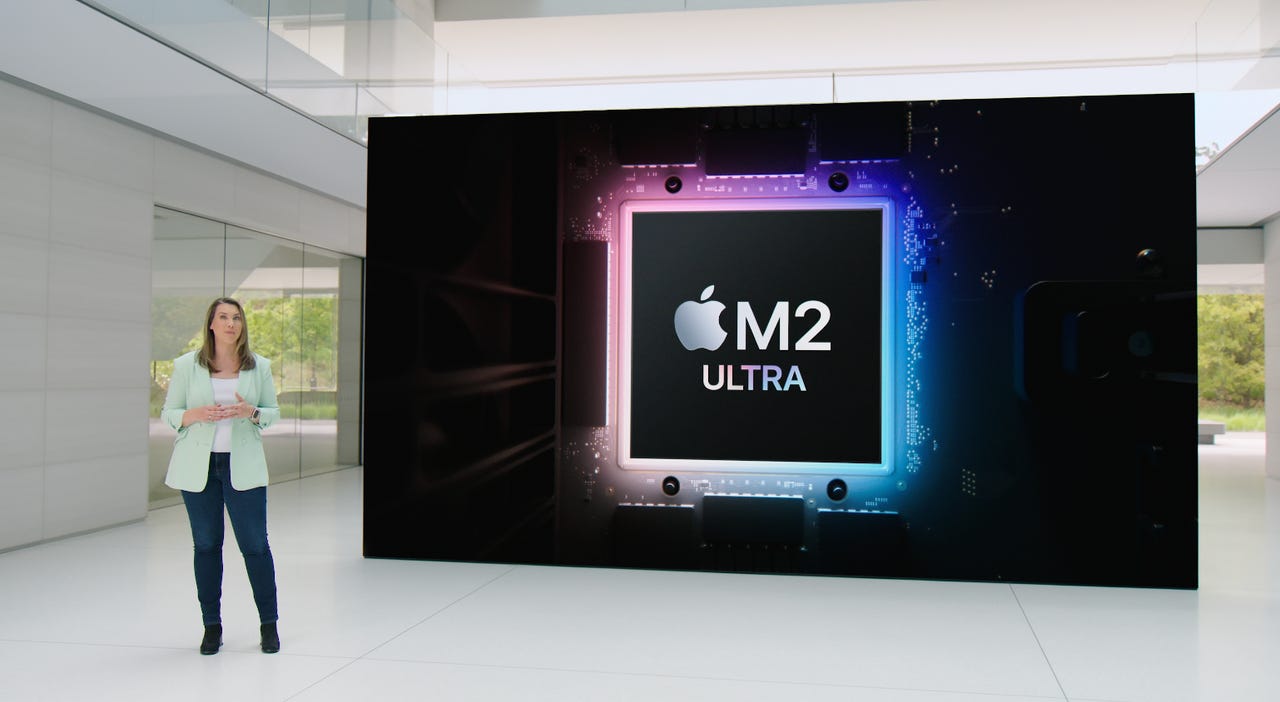
































Apple's M2 Ultra takes two M2 Max chips and connects them via UltraFusion architecture to double up on, well, everything.
AppleApple has finally given theMac Pro behemoth the Apple Silicon treatment,and thecompany's move away from Intel processors is now complete. And what a processor Apple has built for this platform!
Apple's M2 Ultra takes two M2 Max chips -- with their 12 CPU cores, up to 38 GPU cores, up to 96GB of unified memory, and 400GB/s memory bandwidth -- and connects them via UltraFusion architecture (exactly what Apple used to create M1 Ultra chips from two M1 Mac chips) to double up on, well, everything.
Also: All the Mac news from WWDC 2023
This results in what seems like a very impressive chip.
Apple M2 Ultra spec sheet
AppleNow, when Apple unveiled the M1 Ultra, we were treated to some detailed benchmark results. This time -- with the M2 Ultra -- we don't get much detail. Why? Maybe the performance and performance-per-watt figures aren't such big jumps, or maybe the M1 Ultra afforded more of an Apples vs Apples comparison.
Also: The best computers: Comparing laptops, Macs, PCs and more
We do get some broad-brush comparisons, with Apple claiming that the M2 Ultra offers 20% faster CPU performance, 30% faster GPU performance, and 40% faster neural engine performance.
We also get some comparisons to Intel-based iMacs, but the last of these were the 2020-based units featuring Comet Lake Intel processors. Here Apple claims the newMac Studio M2 Max machines are four times faster than the old Intel-based iMacs, while the M2 Ultra systems are six times faster.
M2 Max and M2 Ultra performance claims
AppleBut do bear in mind that these iMacs were discontinued in 2022.
We get similar comparisons to the 2019 Mac Pros, systems built around Intel Xeon W Cascade lake processors.
M2 Ultra performance claims
Apple2019 was a long time ago in tech, and so again the comparisons are not especially useful.
This time around, we don't get any of this, so we'll have to wait for the release of third-party benchmark results.
However, it goes without saying that this chip is likely the fastest processor on the planet. But this chip has very specific strengths, and it is designed for workloads such as video encoding and rendering (the media engine is designed with H.264, HEVC, and ProRes codecs in mind), 3D rendering, and machine learning.
Also: Comparing the best Macs: Is a MacBook or Mac Studio right for you?
The media engine is capable of handling 22 streams of 8K ProRes video playback, which is truly staggering. Combine this with support for up to eight displays, and you get an idea of what this chip can handle.
This is very specific silicon for very high-end systems. But give it a few years and these benefits will trickle down to more ordinary systems such as theMacBook Pro and the iMac .
 Etiquetas calientes:
tecnología
Nuestro proceso
computación
transformadores
Etiquetas calientes:
tecnología
Nuestro proceso
computación
transformadores